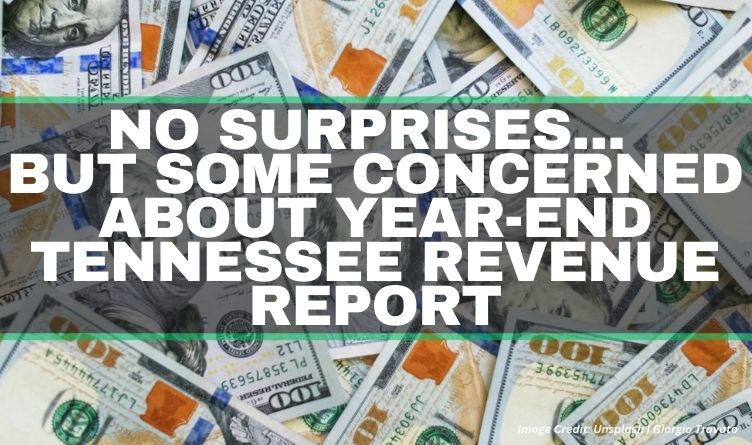Image Credit: Unsplash | Giorgio Trovato
The Center Square [By Kim Jarrett] –
Tennessee’s year-end tax revenues are down $75.2 million for fiscal year 2025 when compared to the previous year, according to the July revenue report, but the reason is not a surprise.
Tax breaks passed by the General Assembly in 2024 resulted in $721 million less in corporate tax collections. Even though sales and fuel taxes are up, it was not enough to overcome the deficit.

While the corporate tax collections are down, the numbers exceeded the State Funding Board’s predictions by $53.6 million.
“I’m pleased to report that Tennessee has exceeded its revenue estimates for the year,” said Jim Bryson, commissioner of Finance and Administration, in a release. “Final receipts will be subject to accruals, but the outlook remains strong.”
Democrats say the picture is not so rosy and have concerns about the $721 million loss.
“Last year, more than 40% of Tennessee’s budget came from the federal government,” said Brandon Puttbrese, spokesman for the Senate Democratic Caucus. “Now, with the Trump budget law passed in July slashing funding for health care, food assistance, and education, we’re facing a one-two punch: deep federal cuts on top of a $721.5 million drop in corporate tax collections here at home. The question is: how will Republican leaders in Tennessee fill those gaps?”
The most recent statewide economic data is not showing the benefits of what Puttbrese calls the “trickle-down” theory, which he said Republicans used to support the corporate tax cuts.

“In fact, employers cut payrolls in July for the first time in six months,” Puttbrese said. “Tennessee’s real GDP decreased in the first quarter. Wages are falling behind inflation and the cost is going up on nearly everything these companies sell.”
The drop in corporate revenue comes as the state is facing a $30 billion backlog in road projects.
The General Assembly added $1 billion to the fiscal year 2026 budget, which Gov. Bill Lee said is a step in the right direction.
“We have worked to maintain our roads and our bridges and our highways,” Lee said in an interview with The Center Square. “We have not spent the money that we need to to expand those. We put a strong effort in maintaining, which is why we have a good road system that people are fairly satisfied with. We have congestion, however, and that has to be addressed.”
The $59.8 billion budget for fiscal year 2026 is a modest 2% growth rate amid financial uncertainties.

“With revenues at more typical levels after years of historic growth, this budget reflects the careful discipline needed to protect Tennessee’s financial future,” Sen. Bo Watson, R-Hixson, chairman of the Senate Finance, Ways and Means Committee, said after the committee vote in April.
The July revenue report showed revenues for the general fund for fiscal year 2025 up $23.4 million, which was just part of the good news, according to Bryson.
“Tax revenue growth in July exceeded expectations,” Bryson said. “A rise in corporate quarterly estimated tax payments and higher-than-expected gross receipts tax collections boosted overall monthly revenues. Sales tax revenues, though higher than in the same month last year, came in just below July’s estimate. All other taxes combined finished slightly above projections.”



